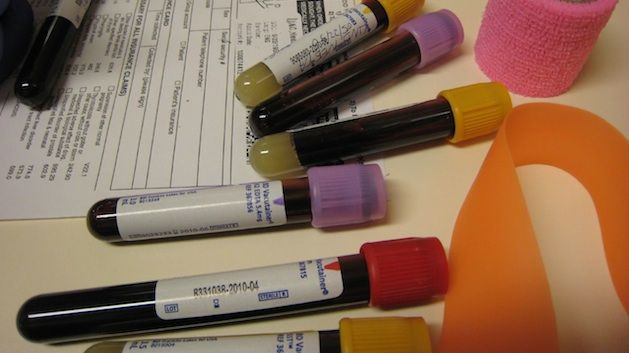HPV Blood Test May Be Able To Predict Risk For Throat And Oral Cancers 10 Years Before Normal Detection

It is widely known that the human papilloma virus (HPV) causes cervical cancers, various forms of oral and throat cancers, and head and neck cancers. But the detection of these cancers in the doctor's office can only occur once the cancer has reached a certain size and visibility, which then requires invasive surgery. But a new finding in the blood of people who have been exposed to HPV shows that the risk for oral cancers can be detected as much as a decade before there are any clinically detectable symptoms.
Scientists from the National Institutes of Health (NIH) have found that at least one out of three people with oropharyngeal cancer, or throat cancer, have antibodies in their blood that are specific for parts of HPV. Antibodies are produced by immune cells called B-cells and attach to invading viruses and bacteria in order to block their infectiveness or call the immune system to attack. Antibodies can also be used as a biomarker for previous infection with a virus or bacteria, as in this case, and tests for HIV, chicken pox, and other infections.
In people who had no detectable oropharyngeal cancer, the presence of the antibodies specific to HPV slipped from 33 percent to just one percent, showing the specificity and sensitivity of the test. The specific HPV virus that causes oropharyngeal cancers is called HPV type 16 (HPV16) and is implicated in more than 60 percent of all cases of this specific cancer. Infection with the virus causes mutations in the DNA of cells, which has been proven to lead to various forms of cancer.
"Our study shows not only that the E6 antibodies are present prior to diagnosis-but that in many cases, the antibodies are there more than a decade before the cancer was clinically detectable, an important feature of a successful screening biomarker," said Aimee R. Kreimer, Ph.D., the lead Investigator from the Division of Cancer Epidemiology and Genetics, National Cancer Institute, in a press statement.
The analysis was part of a long-term study of 500,000 healthy Europeans from 10 countries. Blood from 135 people who developed throat cancer within a 13-year span was compared to 1,600 people who did not develop the cancer. The blood samples were collected at least six years before clinical detection of the cancer, and antibodies were detected as much as 10 years before detection of cancer.
Interestingly, patients who had antibodies against HPV16 were 70 percent more likely to be alive at the end of the study period, compared to those who had no antibodies against the virus. This may be because people who are unable to appropriately create antibodies against the virus cannot fight it off as well, and the virus running free with little attacking it may cause worse cancers.
"Although promising, these findings should be considered preliminary," said Paul Brennan, Ph.D., the lead investigator from International Agency for Research on Cancer (IARC). "If the predictive capability of the HPV16 E6 antibody holds up in other studies, we may want to consider developing a screening tool based on this result."
There are currently two vaccines against HPV, gardisil and ceravix, which protect from various types of the virus including 16, 18, 6, and 11. These specific strains of the virus cause cervical cancers and genital warts. The vaccine is not recommended for those over the age of 26 or those who have already had multiple sexual partners. This is because the exposure to HPV by that time is very likely, and researchers do not know if the vaccine would be effective in those already exposed to the virus.
With the rates of oral cancers on the rise around the world, the ability to detect risk profiles for developing them almost a decade before they appear will allow for closer monitoring and may lead to better treatments down the line.
Source: Kreimer A, Johansson M, Waterboer T, et al. Evaluation of human papillomavirus antibodies and risk of subsequent head and neck cancer. Journal of Clinical Oncology. 2013.



























